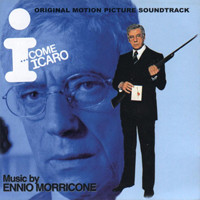- Composed by Ennio Morricone
- GDM / 46m
A French thriller starring Yves Montand, I… comme Icare (“I… as in Icarus”) is a fictionalised retelling of the Kennedy assassination and subsequent investigation, set in an unspecified country (where most people speak French). Henri Verneuil’s film was released to much acclaim in 1979 and won various awards, though seems to have disappeared from consciousness now.
Director Verneuil enjoyed a longstanding and very productive collaboration with the great Ennio Morricone stretching back to the pseudo-western Guns for San Sebastian in 1968 – this was their sixth and final film together. It’s a solid and enjoyable thriller score with numerous colours to it, markedly different from the composer’s most famous entries in the French thriller genre.

The opening theme is “La vérité et le soleil”, a baroque piece full of melancholy – a little closer to some of Morricone’s Sicilian crime thrillers in sound. Sad but beautiful, it’s vintage Morricone, conveying a sort of resigned feeling that’s so apt.
“Reflexion nocturne” is unusual: it’s a darker theme at first, with a haunted suspense sound, which suddenly has an injection of jazz from piano, trumpet and bass as the suspense continues underneath from the strings. This composer’s creativity frequently threw up pieces which make you wonder how on earth he came up with them and this is one. Also falling somewhat into that category is “Recherche obstinée”, a pop thriller variant on the same theme, again managing to be undoubtedly dark despite containing instrumental elements that would usually be anything but.
There’s some more mainstream Morricone suspense, too – the layered strings of “Deux phares dans la Nuit” create almost unbearable tension in the way that only this composer could. On the other side of the coin is a theme called “Sentimental” which is a lovely tune which is – well, you can guess – a pop-based love them very much of its time which is nonetheless delightful.
The final theme – which, incongruously, doesn’t appear until the second half of the album, then appears several times – is called alternately “Icare” or “I… comme Icare” and is a grand, dramatic one full of dark portent which is weirdly delicious in its way. There’s also a brief “Prélude à Icare” (which is even more bizarrely placed on the album, appearing twice in quick succession near the end) – a grand, gothic organ solo which is just great. Finally, there’s a couple of pieces of patriotic source-like music which get the blood flowing, particularly if you’re a citizen of the fictional country in which the film is set.
The score was available on an album released at the time of the film and then briefly issued on CD; some years later an extended edition came from GDM, later reissued by Saimel, with extended content. Unusually they didn’t just reproduce the original album and then add the extra material at the end (the usual way of Morricone expansions) and the album has a very strange structure, with clusters of tracks featuring the same thematic material being placed near to each other – the original sequence was much more satisfying. Fortunately that’s easy to reproduce and you’re left with a stylish, rewarding crime thriller score.
Rating: ****
facebook.com/moviewave | twitter.com/MovieWaveDotNet | amazon.com












Ennio Morricone’s first nomination for César Award. A shame that he was nominated three times and they never awarded him, worst than Academy Awards!
Great job James reviewing some of Ennio’s more obscure and overlooked scores. He was masterful on every genre.